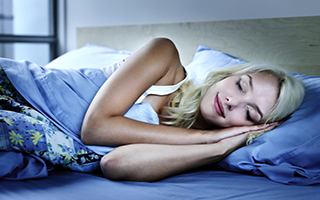
I mentioned a few months ago the importance of getting your "beauty sleep." Your mood and energy levels depend on it. Obesity, diabetes, cancer, and immune deficiency have all been linked to chronic poor sleep quality. Now, a new study, commissioned by Estée Lauder, found that not sleeping well can take a significant toll on your skin as well as the way you feel about your appearance.
Dr. Elma Baron, along with a team from University Hospitals Case Medical Center, conducted this study. They suspected that poor-quality sleep would indeed affect appearance. And the results of their study proved their hypothesis definitively.
Our skin's job is to protect us from our environment, which is full of stressors such as environmental toxins and the sun. And our bodies renew our skin and repair environmental damage while we sleep. If we don't sleep well, it's hard for the body to do its job properly.
To determine just how significant the effects of sleep deprivation are, the study examined 60 pre-menopausal women ages 30 to 49. Half of the participants regularly experienced poor quality sleep, as defined by their average amount of sleep and its quality according to the Pittsburg Sleep Quality Index.
The researchers conducted a visual skin evaluation, as well as several non-invasive tests. These tests included UV light exposure and a skin barrier disruption test, and they had the participants keep track of their sleep duration. They found big differences between the participants experiencing good quality sleep and those experiencing poor quality. The poor sleepers had more fine lines, uneven pigmentation, and skin slackening. Though signs of extrinsic aging, such as coarse wrinkles and sunburn freckles, were similar between the two groups, these signs are typically the result of sun exposure. The intrinsic signs such as the reduced elasticity were much higher in the poor quality group.
Those who got good sleep also had skin that recovered more quickly from environmental stressors. Those who weren't sleeping well experienced prolonged redness, suggesting that inflammation levels were extended longer compared to the good sleepers' levels. In a Transepidermal Water Loss test that demonstrates how effective skin is against moisture loss, the good sleepers recovered 30% better than the poor sleepers.
Sleeping well also affects how you feel about your appearance. This isn't surprising, particularly as poor sleep is linked to higher Body Mass Index. In fact, 44% of the poor sleepers were obese, compared to only 23% of the good sleepers — a difference of 21%. On a self-evaluation questionnaire, the good sleepers had a mean score of 21, but the poor sleepers' mean score was 18.
Clearly, getting enough rest is vital to your skin's ability to heal itself and look its best. When you sleep well, you look better, feel better, and have a better perception of your beauty. Do your best to get the sleep your body needs every night, and nourish your skin as you sleep so it can perform at its peak. If you have trouble sleeping, you can try Pure Sleep by Advanced Bionutritionals. This all-natural supplement combines 18 powerful nutrients to support your ability to fall asleep and stay asleep.
To your health, naturally,

Janet Zand